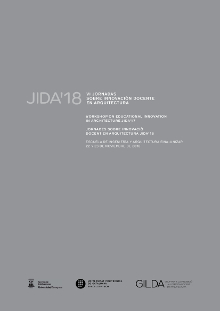Investigation on Model
DOI:
https://doi.org/10.5821/jida.2018.5530Abstract
Investigation on Model is a teaching experience that revisits and updates the teamwork format within the Design Studio courses. To this end, we implement a series of action items: the model, the client, the mock-up and the negotiation. These learning strategies allow to simulate the real conditions our students would find in the real world and in an architectural office nowadays, all of this working towards a common goal. The experience, developed by the Teaching Innovation Group from ETSAM, called “Agglutinative Design Devices”, deals with a reality characterized by multi-skilled professional work, collaboration and complexity, which is far away from traditional individual models. With this intention, the group understands the University as an entity able to affect its context and its discipline, the classroom as a close environment where knowledge between peers can be amplified, the students as a research group akin to a professional office and the ensemble student-Professor as a learning active agent.
References
ASOPA, B. Y BEYE, G. (2001). Appendix 2: The case method. <http://www.fao.org/docrep/W7500E/w7500e0b.htm> [Consulta: 10 de septiembre de 2018]
AYUNTAMIENTO DE MADRID (2015). Transparencia. Concejales, directivos y eventuales. <https://transparenciapersonas.madrid.es/people/maria-cristina-moreno-lorente> [Consulta: 12 de mayo de 2018]
BOEHRER, J., LINSK Y, M. (1990). “Teaching with Cases: Learning to Questionâ€, en Svinicki, M.D. (ed.), The Changing Face of College Teaching. New Directions for Teaching and Learning, no. 42. San Francisco: Jossey-Bass
BRU, S., THERIOT, A. (2018). “Framing the disorderâ€, en 2G, N.76, p. 154,155
EDUCACIÓN Y FORMACIÓN. Apoyo a la educación y la formación en Europa y más allá de Europa (2018). Lifelong Learning Programme. <http://ec.europa.eu/education/lifelong-learning-programme_es> [Consulta: 13 de mayo de 2018]
FACTUM arte (2018). ¿Qué es Factum Arte?. <http://www.factum-arte.com/aboutus?idi=es> [Consulta: 15 de mayo de 2018]
FACTUM Foundation (2018). <http://www.factumfoundation.org/> [Consulta: 15 de mayo de 2018]
FENG CHIA UNIVERSITY (2018). Brief Introduction. <http://en.fcu.edu.tw/wSite/ct?xItem=62526&ctNode=19432&mp=3&idPath=19354_19357_19432> [Consulta: 14 de mayo de 2018]
FIDALGO, A. (2007) “MetodologÃas Educativas†en Innovación Educativa. Conceptos, recursos y reflexión sobre innovación educativa (Ãngel Fidalgo, Universidad Politécnica de Madrid), 8 de octubre. <https://innovacioneducativa.wordpress.com/2007/10/08/metodologias-educativas/> [Consulta: 13 de septiembre de 2018]
KAHN, L.I. (1972). “I Love Beginningsâ€. En: Latour, A. (Ed.), (1991). Louis I. Kahn: Writtings, Lectures, Interviews. New York: Rizzoli. Pp. 285-293
SORIANO, F., GIL, E. (2017). “El Modelo. Aprender a trabajar en equipo con un agente colaborador externo realâ€. Madrid: UPM. <https://innovacioneducativa.upm.es/proyectosIE/informacion?anyo=2017-2018&id=2615> [Consulta: 13 de septiembre de 2018]
UNIVERSIDAD POLITÉCNICA DE VALENCIA (2006). Método de casos. <http://www.recursoseees.uji.es/fichas/fm3.pdf> [Consulta: 10 de mayo de 2018]
VV.AA. (2017). Investigation on Models. Factum Foundation. Madrid: Fisuras de la cultura contemporánea
VV.AA. (2018a). Models. Madrid: Fisuras de la cultura contemporánea
VV.AA. (2018). Tácticas Proyectuales Colaborativas. Manual para anticipar dinámicas colectivas profesionales dentro del aula universitaria. Madrid: Editorial UPM



















